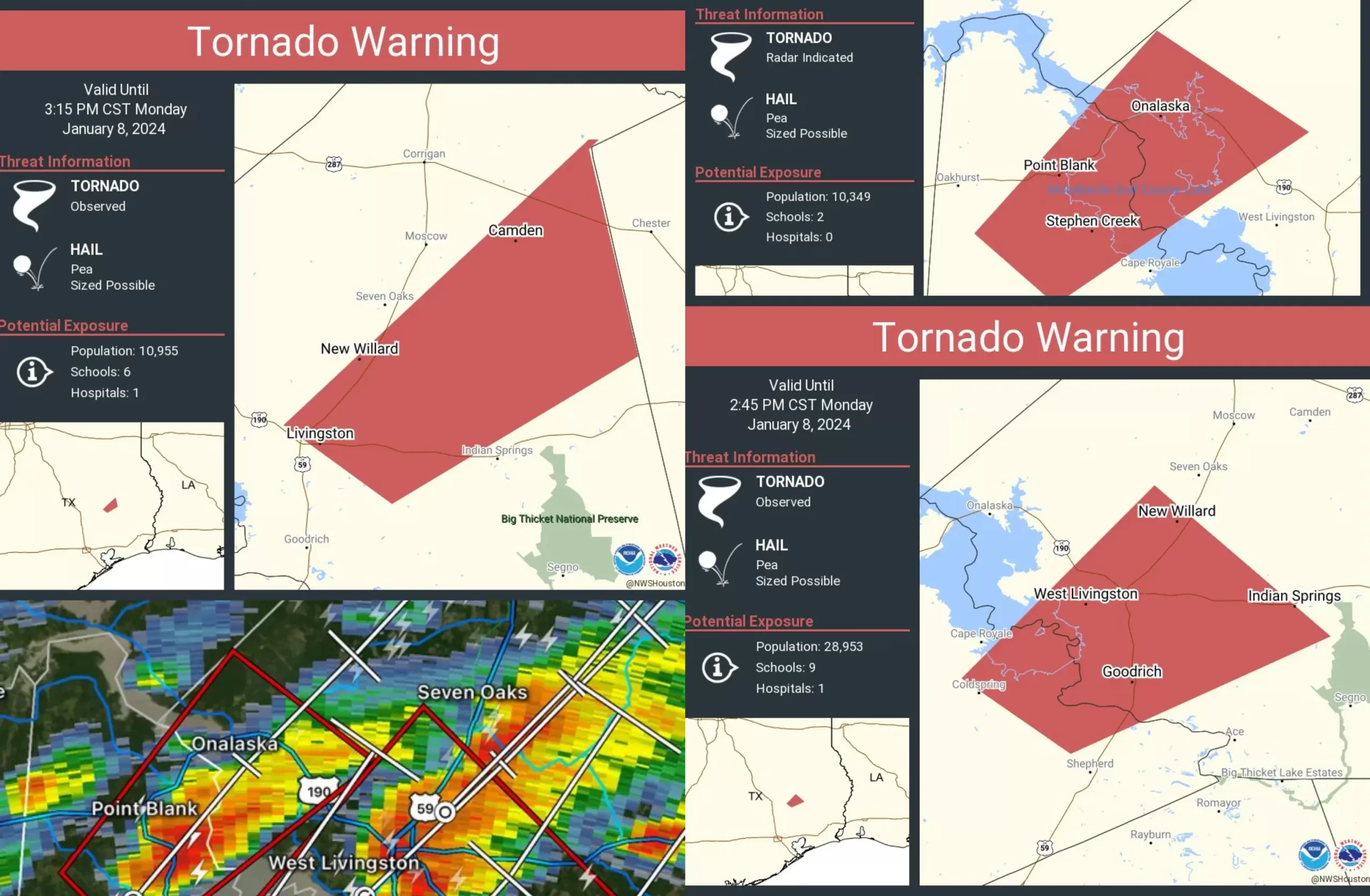When severe weather strikes, it is crucial to stay informed and prepared, especially when tornado warnings are issued. Houston, Texas, has recently experienced a series of Tornado Warnings, bringing the potential for dangerous storms and tornados. An overview of the recent Tornado Warnings in Houston, the impact on the region, safety measures to follow, and the importance of staying prepared. Let’s delve into the details.
The National Weather Service (NWS) issues two distinct types of alerts related to tornados: Tornado Watch and Tornado Warning. It’s important to understand the difference between these two terms.
Tornado Warning including West Livingston TX, Livingston TX and Indian Springs TX until 2:45 PM CST pic.twitter.com/kk1OKaRvxC
— NWS Houston (@NWSHouston) January 8, 2024
-
Tornado Watch: A Tornado Watch is issued when weather conditions are favorable for the development of tornados. During a Watch, it is crucial to stay vigilant and be prepared to take shelter if necessary.
-
Tornado Warning: A Tornado Warning is issued when a tornado has been sighted or indicated by radar. This indicates an imminent threat to life and property, requiring immediate action to seek shelter.
Houston, Texas, recently experienced a series of Tornado Warnings, highlighting the potential dangers associated with severe thunderstorms and tornados. The National Weather Service issued Tornado Warnings for several counties in the Houston area, including San Jacinto, Polk, and Harris.
Weather Alert: State of Emergency Declared in New Jersey
According to the NWS, tornadoes were observed in various locations, including West Livingston, Indian Springs, Onalaska, Point Blank, Cedar Point, Livingston, Camden, and Leggett. These warnings underscore the need for residents to stay informed and take necessary precautions when severe weather strikes.
Tornadoes pose significant risks to both life and property. Understanding the potential hazards associated with tornadoes is essential to ensure personal safety and protect your belongings. Here are some of the hazards to be aware of:
-
Strong Winds: Tornadoes are characterized by extremely strong winds that can reach speeds of over 200 miles per hour. These powerful winds can uproot trees, damage buildings, and cause flying debris, posing a serious threat to anyone in their path.
-
Flying Debris: Tornadoes can pick up and propel objects of all sizes at high speeds. Flying debris, including tree branches, signboards, and even vehicles, can cause severe injuries and property damage.
-
Hail: Severe thunderstorms often accompany tornados, bringing the potential for large hail. Hailstones can vary in size, from small pellets to golf ball-sized chunks, causing damage to vehicles, windows, and roofs.
-
Flooding: Tornadoes can also trigger heavy rainfall, leading to flash floods. These floods can quickly inundate roadways, homes, and other low-lying areas, making it extremely dangerous to navigate or evacuate.
The recent Tornado Warnings in Houston and the surrounding areas have kept residents on high alert. The threat of severe weather has necessitated precautionary measures, including the issuance of Tornado Watches and Warnings, to ensure the safety of the community.
During these weather events, it is crucial to stay informed and follow the guidance provided by local authorities and the National Weather Service. Houston city officials have advised residents to be prepared for high winds and severe weather, particularly those attending events such as the College Football National Championship game.
When a Tornado Warning is issued, it is essential to have an emergency kit ready. An emergency kit should include essential items that can help you and your family during and after a tornado. Here are some items to consider:
-
Water: Store at least one gallon of water per person per day for a minimum of three days.
-
Non-perishable Food: Stock up on non-perishable food items that require no cooking or refrigeration.
-
Flashlights: Have multiple flashlights with extra batteries to ensure visibility during power outages.
-
First Aid Kit: Include basic medical supplies such as bandages, antiseptic wipes, and over-the-counter medications.
-
Emergency Blankets: Keep emergency blankets on hand to provide warmth in case of extended power outages.
-
Battery-powered Radio: Stay informed about the latest updates on the weather situation by having a battery-powered radio.
-
Personal Hygiene Items: Pack essential toiletries such as toilet paper, soap, toothpaste, and feminine hygiene products.
-
Whistle: A whistle can help you signal for help if you become trapped or need assistance.
Developing a safety plan is crucial to ensure everyone in your household knows what to do during a tornado. Here are some key steps to include in your safety plan:
-
Identify a Safe Shelter: Identify the safest location in your home where you can take shelter during a tornado. Ideally, it should be a small, windowless interior room on the lowest level, such as a basement or a bathroom.
-
Practice Sheltering Procedures: Regularly practice tornado drills with your family members to ensure everyone knows the designated safe area and understands the necessary precautions to take.
-
Designate a Meeting Point: Establish a meeting point outside your home where everyone can gather once the tornado has passed. This will help you account for all family members and ensure their safety.
-
Stay Informed: Stay tuned to local news, weather alerts, and official updates from the National Weather Service. Reliable sources of information will provide you with the latest information and guidance during severe weather events.
